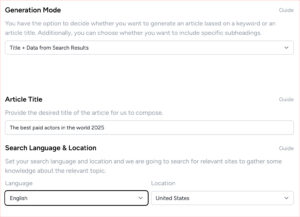Content, in its broadest sense, can be defined as any material that is used to fill a document or publication. Dive in a little deeper, and you’ll find that great content is better defined by Business Dictionary as “both information and communication: the sum total of the freshness, readability, and usefulness of the information presented, and the manner in which it is presented.” To help you make sure your content is always top-notch, we have listed nine criteria how to write great content for your website:
1# Originality

Your page content also needs to be original in terms of standing out. Regurgitating old content by rewriting will not engage your users – your content will not be shared as much as it should be and you’ll soon find your page ranking lower.
2# Headline strength
“On average, five times as many people read the headline as read the body copy. When you have written your headline, you have spent 80 cents out of your dollar.”
David Olgivly
Things haven’t changed much since when these words were written in 1963. So put some effort into your headlines.
3# Actionality

Using a CTA (call to action) is a great way of getting a response from your audience. You can incorporate CTAs in your content by weaving them gently alongside the rest of your text in the form of links, for example:
“Have a look at our services and set yourself on the path to discovering great content.”
Another useful strategy is to connect with your reader through the use of emotive diction. Studies show that people are more likely to take action if something they’ve read has stirred a strong emotion such as anger or pity. Ever seen how many signatures petitions on social media get when accompanied by an upsetting picture? Enough said.
4# Usefulness
When users conduct a search, they’re not doing it for fun. More often than not, they’re looking for answers, and it’s your job to provide them.
Say one user is looking to buy a specific model of mobile phone. It’s likely they will type in the exact model they’re looking for into their Google search. They will also expect to be guided to land on a website that sells this exact model, and not just any site that happens to stock smartphones.
Knowing how to use your keywords can do much to help provide those answers (i.e. products) your visitors are looking for. So make it a point to conduct your keyword research and develop a clear keyword strategy.
5# Accuracy
As a website owner, it is your responsibility to ensure that the content on your page is 100% accurate. What appears on your site vouches for your reputation – so imagine how harmful inaccurate information could potentially be for your brand.
6# Engagement
The content on a website should not only be informative, it should also be engaging for its readers. Content that users find amusing or entertaining is more likely to be shared, directly affecting your visibility, increasing traffic and may even result in a sharp sales increase.
7# Universality
The internet is the widest of the earth’s highways, and keeping localisation in mind is extremely important if you are planning on expanding globally. Localisation blunders can carry some seriously staggering financial implications.
8# Conciseness
Brevity may not be the most important characteristic of your page’s content, but, if we were to keep the “15-second rule” in mind, users rarely read more than 20% of the material on a page. This is why providing content that goes straight to the point is essential.
9# Freshness
Content that is not regularly updated is quickly forgotten by search engines and thus become less discoverable during search results. Providing outdated content can also have a negative effect on your credibility. If you are not posting evergreen and timeless content, make sure it stays up-to-date and correct all the time.
Find a content provider to write great content for your website
Now you know how to write great content for your website, but it implementing it is easier said than done. Gladly here at Topcontent we pride ourselves on always providing content with these nine characteristics. Have a look at our content writing services and set yourself on the path to discovering great content.
Contact us to get a free quote!





